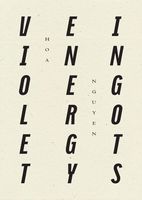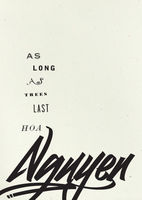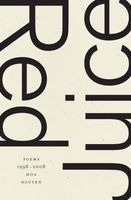“I Want the Blur in There,” an Interview with Hoa Nguyen.
By James Lindsay
In his introduction to Red Juice (poems 1998-2008), Anselm Berrigan describes the poetry of Hoa Nguyen as, “sonic environments made word by word, provoked by lived experience into forms that, as she puts it, ‘press in and out.’” And indeed, much like the work of Emily Dickinson or Frank O’Hara, there is an everydayness, a beginning in the here and now that fuels Nguyen’s work, but it’s also shadowed by a doubtful “inner” undercurrent that comments on the action. As readers we are offered a free association of commonplace, domestic, or political images, contrasted by a stream of unconsciousness that organizes the images in precarious, uncertain ways. These poems, frugal in wording, are demonstrations of reaching, but not reaching towards something that can be possessed, reaching as the act of extending thought in an attempt to stretch it, observing how it acts as it elongates. Wave Books will publish her new collection, Violet Energy Ingots, this September.
James Lindsay:
In your more resent work there seems to be skepticism toward your own intent (Empire seeks power I wrote that /as “Vampire Empire” Red Voice ). You second-guess your voice, pointing out what you had originally meant to write, like highlighting a Freudian slip. When did you start noticing this unconscious intent in your writing?
Hoa Nguyen:
I'm interested in works that expose its own troubles, that self-problematize, and risk uncertainties. In contrast to works of surety, ones that offer a version of a complete answer--a move that often feels smug or phony to me. But the intent isn't unconscious; it's built in. Like when musicians intentionally record songs that include the slip of strings over a fret. I want the blur in there.
Lindsay:
Is the blur something you can actively write towards? Or is it subtler; something you have to spot? How do you know it when you see it?
Nguyen:
I observed how this operates in writing (and music), considered the strategies that achieved them, and actively invite these as I work. This can look like pointing to the materiality of language or the act of production. It can look like suppositions that are overturned or implicated. I look for the ways that language can slip or slide visually and aurally. I've long been interested in poems that vibrate a little, that buzz and blur a bit, invite alternate voices, and create a kind of energy field of sound and sense.
Lindsay:
Do you have a musical background? Your poems have such a distinct rhythm to them, it's hard not to think of a musical influence behind them.
Nguyen:
No, I have no musical training at all.
My first memory of music was a collection of Vietnamese folksongs from the Mekong Delta, and a compilation of "greatest hits" by Johnny Cash recorded on reel-to-reel tapes. These and the player were brought to the US from Vietnam when my family relocated when I was a young child. My mother tells me that I sat and listened to these two recordings especially--and for hours. I would later become a fan of punk and post punk and have a 3 hour show on college radio that I named "Moods for Moderns".
I once had a dream that announced to me very plainly that one of my outward expressions (my animus) was to be the maker and singer of songs and to write "a great American folk song". I took this to mean my poetry.
But I think what operates inside of my poems is that I'm searching for a ghost language. I lost my original language, Vietnamese, a monosyllabic tonal language, due to rupture and circumstance. My only language is English. I think when I write, the poems attempt to recover or somehow express this ghost language, this musical, lost language. It is in my body, but I can't speak it. Instead I feel the Vietnamese language as a nerve ghost. And the poems become a way for that language to arrive somehow.
Your CanLit News
Subscribe to Open Book’s newsletter to get local book events, literary content, writing tips, and more in your inbox
Lindsay:
Does it ever arrive? Much of your work feels like it's reaching but never quit making it. Not in the sense that the poems fail, but that they are trying to display reaching or searching for something that is never fully named.
Nguyen:
No, it never arrives. It's always in the act of reaching. I tend toward heavy stresses, spondees often. An editor recently said that the heavy stresses position them "to hear [the] demotic word choices in a new way, and then [the] formal decisions make me perfectly still but also as if I'm about to tip over - that's how your poems make me feel: like I'm about to fall but I never quite do", a statement I utterly love.
Lindsay:
Almost falling is a good way of describing the affect. For me, your work seems very immediate in that it exists for a particular time and space, even going as far as naming specific dates ("Gasoline @ $65 dollars a barrel / (13 August 2005) from The Starbucks Mermaid), so it's interesting that your upcoming collection, Violet Energy Ingots, directly addresses American imperialism and politics in a more historical way, with poems about Andrew Jackson and September 11. What was it that pushed you to start dressing politics in a more direct way?
Nguyen:
I didn't intentionally write more directly to address politics, but I have been looking more and more of the patterns of power--how it conquers, how it divides, and how it maintains systems to benefit the rich elite to consolidate and continue to manage power to their benefit. Really I think of poets as systems analysts.
Lindsay:
What does poetry potentially bring to political analysis that is different from journalism of fiction?
Nguyen:
Not sure how much different poetry might be from non-fiction or fiction. It's another mode. Poetry can shape public consciousness and cultural identity, influence public reflection, present a form of dissent, and articulate tensions between a public and private life.
Lindsay:
So are there not differences between modes and how they communicate information? Politics aside, do you think poetry has more in common with other modes than it doesn’t?
Nguyen:
Well naturally there are differences: circulation, access, audience preference, and forms of address. I guess I was saying that the effects might be shared--and no, I don't think it has more in common with other modes than it doesn't. My sense is that poetry is often refused or met with indifference. That fiction, nonfiction, and also music tends to be positioned in North American culture as to have wider distribution and positive reception.
Lindsay:
What do you think has changed in the North American cultural climate that now poetry is met with indifference? Why does fiction and non-fiction overshadow poetry in a way they previously did not, say, in the '60s?
Nguyen:
I'm not sure I'm equipped to say. Poetry aligned as elite and obscure generally? Educational institutions introducing young readers to poetry as some rarified non-alive art? Lack of cultural support for poetry as part of a lived experience? Growing anti-intellectualism? The ongoing war against the imagination?
Lindsay:
You teach poetics and run privet workshops. How begin to engage with your students about poetry? How do you start with a group of strangers?
Nguyen:
I've run private workshops out of my house for 17 years. We focus on a single text by one poet, often a large selected or a collected works. We dive right in. It's not about us; it’s about attending to the work. We read aloud for an hour. At the start of the second hour, I make observations about how the poems are operating, create a writing prompt with several possibilities, and then we write. For those participating in person (there’s a virtual option), before the close of the second hour, we are invited to share the raw writing. An intimacy is created as we proceed in this work; that is, we don't remain strangers for long.
The Bagley Wright lecture series asked me to speak about the workshops and pedagogy in Seattle in April 2016. I wrote this essay and gave a one hour follow up talk. In the essay I write:
Part of this might mean creating a virtual or literal hearth around which to gather. I teach out of the home I share with Dale [Smith] and our two sons. I teach out of the living room. My writing desk is in the living room. I’ve hosted countless poetry readings in living rooms. I am writing this right now in my living room. Which makes me think about how poetry can be a living room, one based on connectivity, relationships—a room you can walk around in, share company, and make more art.
The views expressed by Open Book columnists are those held by the authors and do not necessarily reflect the views of Open Book.
James Lindsay has been a bookseller for more than a decade. He is also co-owner of Pleasence Records in Toronto, a record label specializing in post-punk, odd-pop and avant-garde sound pieces.






